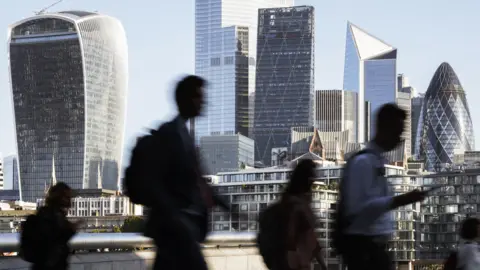Bankers told to return to desks as restrictions end
 Getty Images
Getty ImagesBig banks, advertising firms and insurers have announced plans to return to the office after the government scrapped its work-from-home guidance for England with immediate effect.
However, most said flexible working arrangements would remain in place.
Some have questioned whether the move is premature and could worsen already-high staff absences.
But others said city centres hit hard by Omicron would get a much needed boost as commuters returned.
Banking group HSBC said its staff started returning to the office on Thursday, while Standard Chartered has asked employees to come in from Monday - although both lenders have flexible working arrangements in place.
Citigroup and Goldman Sachs also plan to resume office working.
Meanwhile Havas, a French advertising agency with 11,500 staff worldwide, told the BBC it would "fully reopen" its London office from Monday after more than a month of employees working from home.
Latest figures suggest that 37% of working UK adults did at least some work from home in 2020, up from 27% the previous year.
The government introduced its Plan B restrictions in December to battle the Omicron variant, but on Wednesday eased them saying infections had peaked nationally.
Along with the end of working-from guidance, the requirement in England for mandatory face coverings in public places and Covid passports will both be ditched from next Thursday.
Chris Hirst, global head of creative at Havas, told the BBC's Today programme: "Many of our employees really do want to come back into the office, but there are some people who are nervous and we don't have a one-size-fits-all approach to that.
"We'll be talking to those people individually and finding solutions that work for them."
Insurance firm Zurich, which employs 4,500 in the UK, said it was "excited" to welcome staff back to its offices but most would continue on a hybrid basis.
"We had a flexible working policy prior to the pandemic, but [Covid] meant suddenly everybody was experiencing the benefits and some of the downfalls and we've learnt a lot," chief operating officer John Keppel told the BBC's Wake up to Money programme.

'I can't wait for people to go back to the office'
 Alex
AlexAlex, 28, says he can't wait for people at his law firm to go back to the office in the next month.
He joined the company in November, when it was working on a hybrid basis, but virtually all staff have been working from home since mid December.
"I'm a new joiner and just getting started," he told the BBC. "But it's been really difficult to learn about the company culture, make new connections and make an impression."
However, he does appreciate the flexibility of being able to work from home, and supports his firm's goal of moving to a 60:40 split between office and home working.
"Working from home can be more productive. Although now people have got used to doing it full time, I think some will be loath to give it up."

Network Rail said the number of people using its stations between 6:00 and 10.30 GMT on Thursday was up 10% compared with the same period last week.
But the statistics show daily passenger numbers had been increasing even before the guidance to work from home in England was lifted yesterday afternoon.
Thursday's figure was just 1% higher compared with Wednesday.
Business groups have broadly welcomed the easing of Plan B restrictions in England, with the CBI calling for "greater consistency in how we live with the virus in the longer term".
Lord Stuart Rose, chairman of Asda and former boss of Marks and Spencer and Argos, hailed the decision to scrap the guidance.
"I cannot believe we have a nation sitting at home now cowered by this government, because they are fearful of this virus," he said.
"It is something we have to now live with."
 Getty Images
Getty ImagesAccording to the Times newspaper, the government has asked civil servants to go back to their desks as an example to other employers.
But some have questioned the safety of the move at time when the NHS remains under pressure.
The British Chambers of Commerce also urged the government to improve access to rapid testing so firms could bring staff back to workplaces with confidence.
"With infection rates still high, many firms are experiencing significant staff absences and will be cautious about teams rushing back to the office when that could result in further absences," BCC director general Shevaun Haviland said.
"Maintenance of testing capacity must also be a priority for government, with reports still reaching us of firms unable to access rapid testing at times when they need it."
Boost for city centres
Unions also said employers had to ensure a safe return to work, and provide flexible working when staff wanted it.
The TUC called for a better sick pay offer from government amid concerns that many workers will be infected and have to take time off on statutory sick pay.
Others, however, said the change in guidance was overdue for city centre retailers, which rely on commuter trade that has dried up over the last few months.
On Thursday, the City Pub Group, which has 46 sites, said it expected "consumer confidence and consequently demand" to grow once office workers return to work.
And the Gym Group said demand was returning after a slow December, and would "show further improvement" due to the end of work from home guidance.
Matthew Fell, the CBI's chief policy director said: "Blanket work-from-home guidance has had significant downsides for city centre trade in sectors such as hospitality and retail."
According to BBC research in September, most people do not believe workers will return to the office full-time after the coronavirus pandemic.
A total of 70% of 1,684 people polled predicted that workers would "never return to offices at the same rate".
